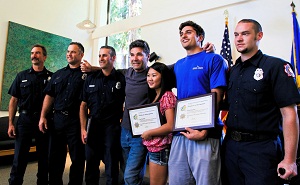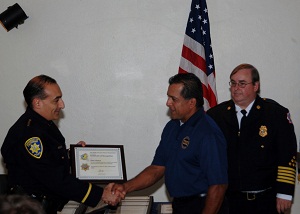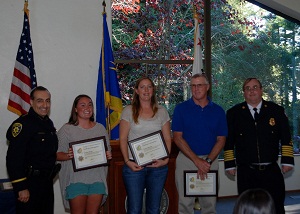Campus News
Recognition Ceremony for Lifesaving Actions
A recognition ceremony took place at the Stevenson Event Center on November 5 that honored sixteen individuals whose actions helped save three lives.



A recognition ceremony took place at the Stevenson Event Center on November 5 that honored sixteen individuals whose actions helped save three lives. In three separate campus events, the individuals used the lifesaving skills and training they learned through CPR classes taught by UCSC Fire Department.
The ceremony was hosted by Fire Chief Jeff Trapp and Police Chief Nader Oweis.
In September 2011, Paul Ybarra, a community safety officer, responded to a medical call regarding a possible drug overdose. Arriving on the scene, Paul found the student to be unresponsive and not breathing. He quickly called 911 and immediately initiated CPR on the student as per training. Ybarra continued to provide CPR until UCSC Fire Department B-Shift (Captain Britten Miles, Coleen Dwyer, Andy Emhoff, and Brian Thomas) arrived on scene and took over medical care of the student. Without his intercession, medical responders report the student would not be alive.
In February 2012, OPERS staff found a community member unresponsive in the men’s locker room shower. The quick, collective actions of students Brett Elliott and Eric Aeeves, along with staff members Kim Musch, Kristen Brown, and Rachel Neuman, saved this man’s life. Fire Department A- Shift (Acting Captain Coleen Dwyer, Sean McKenna, and Brian Thomas) arrived on scene and took over medical treatment.
In September 2012, student Eric Charles, first on the scene, reported to the Wellness Center staff that a community member was unconscious in the center. Alexander Garcia performed chest compressions, while Lai Saelee called 911, retrieved the AED, and controlled the scene. Fire Department B-Shift (Captain Britten Miles, Troy Souza, Andy Emhoff, and Kyle Emmert) arrived within two minutes and took over medical care.
The community member from the February 2012 incident, Ron Dussault, attended the ceremony with his wife; he very emotionally thanked those who were responsible for his health and life today.
These incidents did not start with the 911 call; they began with the commitment of professionals like Ron Esche, a UCSC Fire Department engineer. Esche believed our campus would benefit from Advanced Life Support (ALS) services; through his persistence and hard work, the designation became a reality in July 2011.
Prior to this change, the Fire Department had provided EMT-level basic life support (BLS) service, which is limited to simple, non-invasive techniques such as oxygen administration, CPR and basic bleeding control; personnel had to wait for the arrival of AMR paramedics to initiate advanced life support techniques. Because the Fire Department arrives on scene an average of 8 minutes faster than the responding ambulance, Fire Department paramedics are now able to start life-saving techniques that much more quickly, offering a greater chance of survival for our most seriously ill and injured patients.
Advanced life support provides a higher level of treatment for critical medical situations such as cardiac emergencies, breathing emergency, serious trauma and other life-threatening conditions.
To learn more about upcoming CPR classes please go to the Fire Department web site at: http://fire.ucsc.edu/public-education/cpr